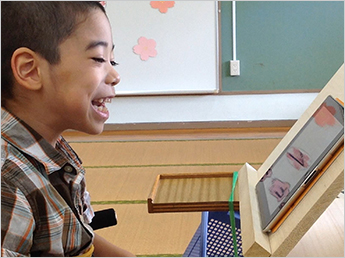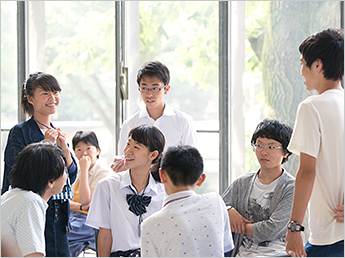Responding to
the Digital Divide


Working to enable information
access for everyone
- Safe and comfortable smartphone solutions for people of all ages
- Supporting youth with special needs
- Using AI to create an environment where everyone can talk smoothly
- Expanding opportunities of those facing challenges in daily life
- Supporting the use of technology in teaching leadership to youth with special needs
- Promoting ways to resolve the digital divide through providing information communication devices for free
To meet the diverse needs of customers, SoftBank offers several brands with different features: ‘SoftBank’ for users actively using smartphones, ‘Y!mobile’ for light users, and ‘LINEMO’ for online-only services.
In response to the increasing demand for online services from customers who have difficulty visiting shops and from digital-native generations, we have also developed our online shop. Additionally, in the fiscal year 2024, 13% of our total customers used our online services for contracting, and these accounted for 11% of our total revenue.
Safe and comfortable smartphone solutions
for people of all ages

The Company offers smartphone classes nationwide for individuals who may be unfamiliar with using smartphones. Participation is open to everyone, regardless of their mobile device or carrier.
| Specialized instructors provide support | Smartphone Advisors who hold the Company's original certification assist participants with their questions and issues. | |
|---|---|---|
| Class formats tailored to participants | In-person classes | You can attend the classes in person at a nearby SoftBank shop or at public or commercial facilities. |
| Mobile classes | The Smartphone All-Around Support Vehicles visits areas with limited transportation or locations far from shops. You can take the classes online inside the vehicle using monitors and tablets. It is a mobile classroom where you can learn with ease. | |
| Online classes | Participants can take the classes from home or by gathering at nearby municipal facilities such as community centers. They can learn essential smartphone skills with confidence, without needing to travel far. | |
Applications for smartphone seminars for municipalities and organizations are accepted through the form below. If you would like to participate as an individual, please contact your nearest SoftBank shop.
| Major Courses | |||
|---|---|---|---|
| Target audience | Course | Estimated time | Contents |
| For people who do not own a smartphone or are beginners |
|
60 minutes |
|
| Beginner-level users |
|
60 minutes |
|
| Open to anyone |
|
60 minutes |
|
- [Notes]
-
-
*
We offer courses in addition to those listed above. Please use the application form to inquire about other courses.
-
*
We have established our own guidelines for infection prevention measures.
-
*
Instructors may not be able to be dispatched depending on the region.
-
*
Supporting youth
with special needs

Since 2009 SoftBank has been working with the University of Tokyo Research Center for Advanced Science and Technology to jointly conduct the Magic Lamp Project, a case study project utilizing mobile device functions for children with special needs.
By lending tablets and the humanoid robot Pepper* to participating schools at no cost for a specified period and offering support that leveraged technology, the Company generated practical cases that encouraged children to participate in society.
From FY2024, as the next phase, the Company has been promoting inclusive education by building on past initiatives and implementing outreach programs conducted by municipalities and schools.
Through the use of ICT, children are able to do things that they previously could not, raising their level of motivation. We plan to expand our activities to enable children to discover even more of their inherent capabilities.
- [Note]
-
-
*
Provided at no charge in connection with SoftBank Group Corp.'s Pepper Social Contribution Program.
-
*
Using AI to create
an environment
where everyone can
talk smoothly
SureTalk is a communication tool jointly developed by The University of Electro-Communications and SoftBank Corp. that uses AI to facilitate communication between users of signed languages and users of spoken languages.
By tracking body movements captured by a camera-equipped device and extracting sign language features, the AI recognizes signs and converts them into text in real time. Sign language recognition requires a large amount of sign language video data to extract the unique characteristics of individual sign gestures. By quantifying and training AI models with this data, it becomes possible to recognize it as a unified sign language.
Using SureTalk, we aim to build social infrastructure to enable people with hearing disabilities to communicate freely in all kinds of situations.
Expanding opportunities of
those facing challenges
in daily life

Assist Guide is an app that allows users to make a visualized list of things to do and how to do them for use in daily life. With smartphones, users can photograph each step of a task, add explanations and arrange them in order to make it easier to understand the activity as a whole.
Assist Guide can help children and those with other difficulties in daily life (including those with intellectual or developmental disabilities) broaden the scope of their activities in daily life.
In November 2021 and July 2022, Kagawa University and the city of Takamatsu, Kagawa, carried out demonstration tests applying the app to using trains and buses.
Participants used Assist Guide, in which the steps to get from point A to point B were laid out in photos. With the app, participants who previously had difficulty using trains and buses, including individuals with intellectual and developmental disorders, were able to travel on their own.
The Company will continue to hold workshops nationwide and provide opportunities for participants to learn how to use various apps.
We will continue to help remove barriers in society using Assist Guide to create environments that allow users to exercise their full abilities.
Supporting the use of technology
in teaching leadership to youth
with special needs

Since 2007, SoftBank has been supporting DO-IT (diversity, opportunities, internet working and technology) Japan (run by the Research Center for Advanced Science and Technology) to help youth with special needs enter university and find employment.
This program supports students from elementary school through to university who have difficulty reading and writing, with the goal of enabling them to be future leaders in society.
SoftBank will continue to support communication for participants with special needs or suffering from illness, and to foster openness and diversity by identifying barriers in society.
Promoting ways to resolve
the digital divide through
providing information
communication devices
for free
The number of services and devices using Internet communications is increasing every year, and IT has developed into an important lifeline which supports QOL (quality of life). At the same time, it is said that a digital divide is being created due to differences in Internet accessibility according to factors such as living environment and income. When the volume of accessible information is low, this leads to lost opportunities to connect to convenient lifestyle services and new information, which definitely has an impact on academic ability, employment, and income level as well.
As part of our efforts to address the digital divide due to income, SoftBank provides smartphones, tablets, and other information communication devices for free to children who are unable to receive learning opportunities due to poverty and nonprofit organizations that support orphans and other children. We will promote the realization of a society in which anyone, regardless of their living environment, can experience the convenience of the Internet through ICT.